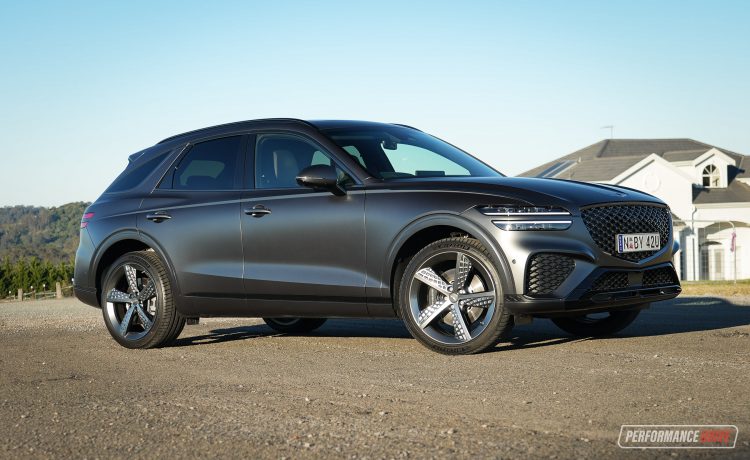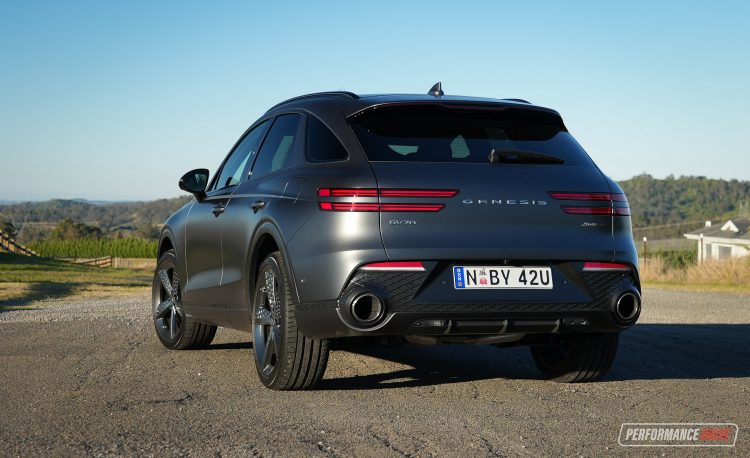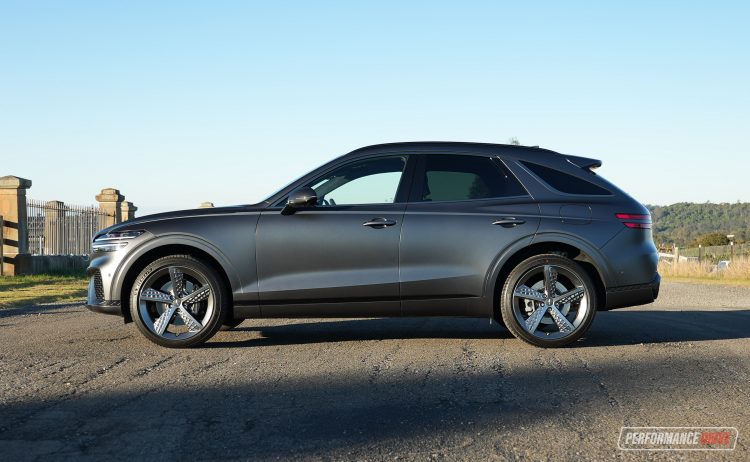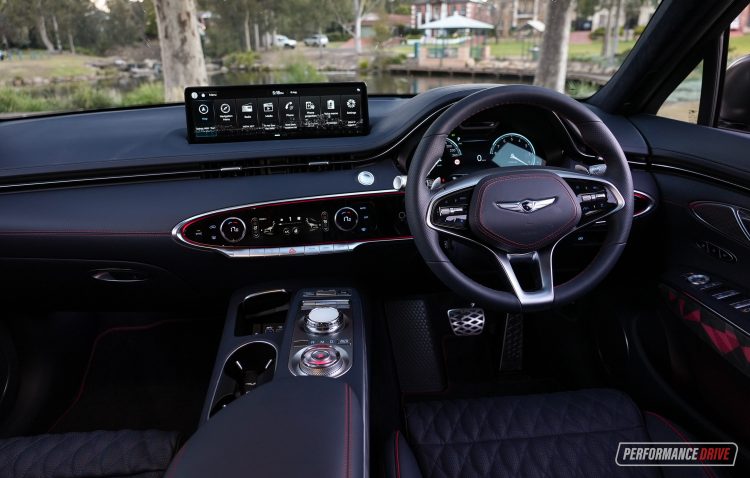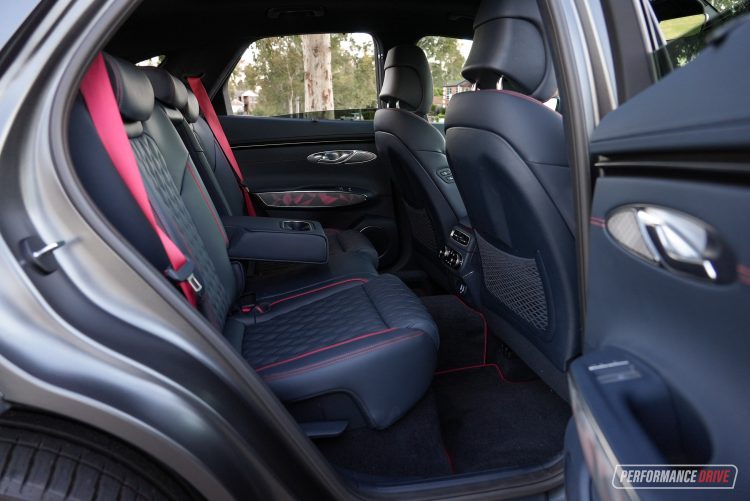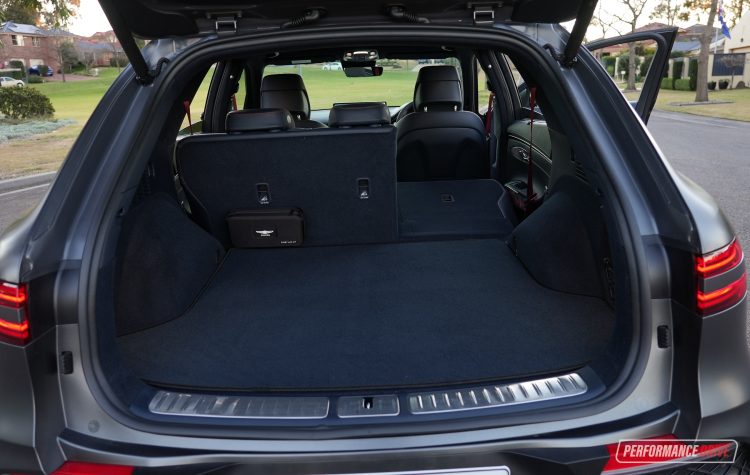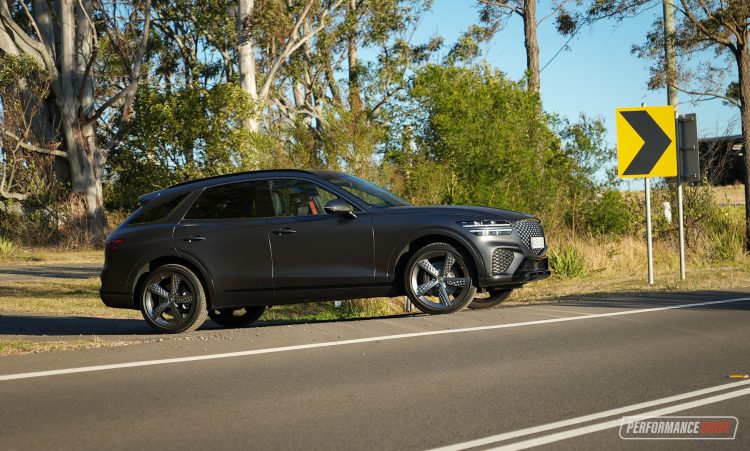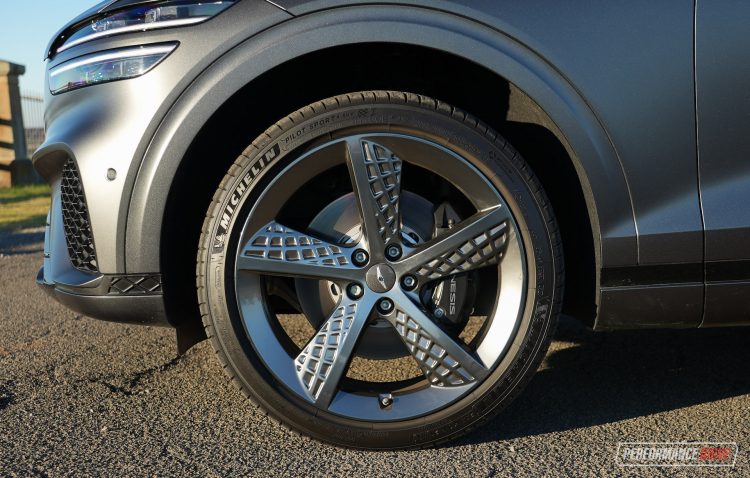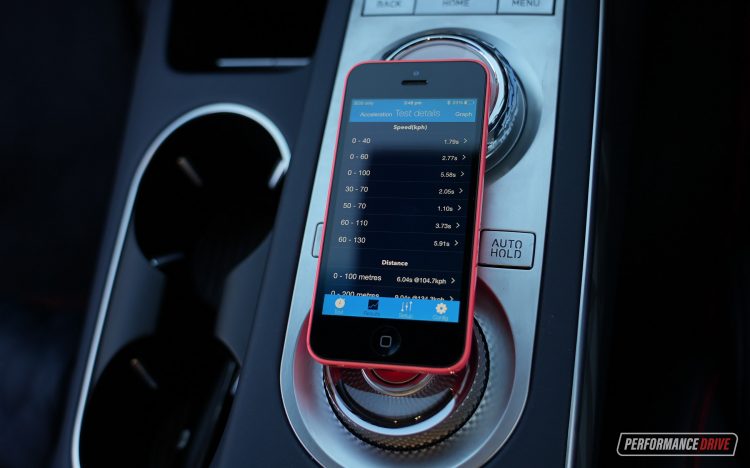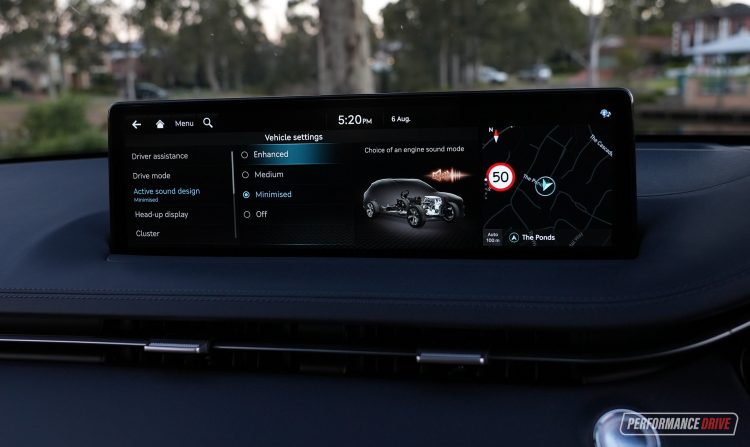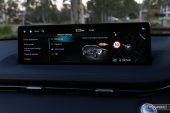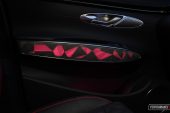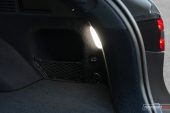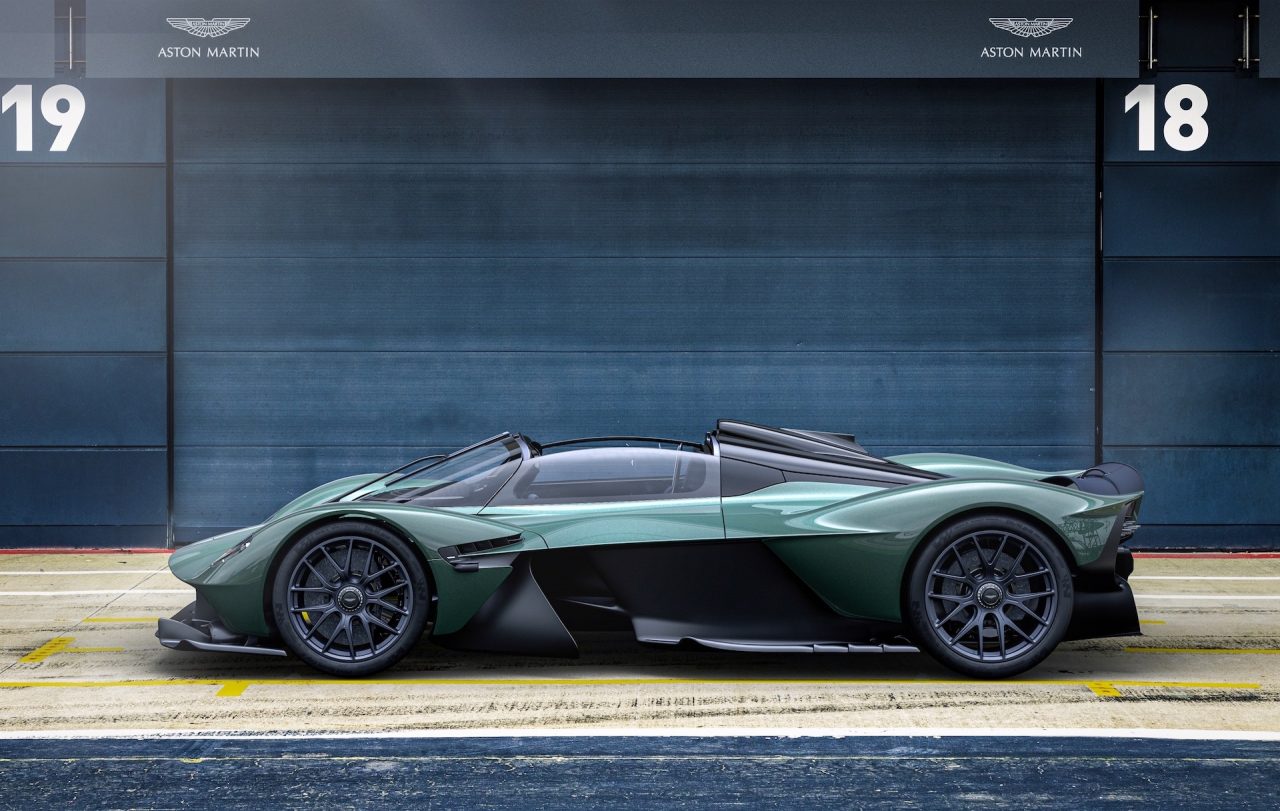Well isn’t this a breath of fresh value-packed air for the premium, optional-extra-plagued mid-size SUV market segment. It’s called the Genesis GV70, and it is the brand’s first mid-size SUV offering.
For this test we’re sampling the flagship 3.5T AWD Sport. However, this is actually part of the official Australian media launch event, which, due to COVID-19, had to be stripped down to an online presentation paired with a few days behind the wheel in one variant. We’ll try and talk a bit about the other variants, but we’re mainly focusing on this 3.5T.
One of the key attractions to the GV70, from the perspective of this specific market segment and its key rivals, is the price and packaging. Genesis offers an incredible amount of standard kit – far more than any of the key competitors. So the value-for-money equation here is very high. But on top of that, the actual starting prices are, generally, lower across the board than most rivals. Prices start from the following (excluding on-road costs):
Genesis GV70 G2.5T RWD: $66,400
Genesis GV70 G2.5T AWD: $68,800
Genesis GV70 D2.2T AWD: $71,800
Genesis GV70 G3.5T AWD: $83,400
2021 Genesis GV70 3.5T Sport – THE SPECS
[column width=”47%” padding=”6%”]Engine: 3.5-litre twin-turbo V6
Output: 279kW@5800rpm / 530Nm@1300-4500rpm
Transmission: Eight-speed auto
Drive type: All-wheel drive
Wheels: F & R: 21×9.0, 255/40
ANCAP: Not tested
Tare weight: 2038kg
Power-to-weight: 7.30:1 (kg:kW)
Official fuel economy: 11.3L/100km
Economy during test: 12.9L/100km
Fuel capacity/Type: 66L/95 RON[/column] [column width=”47%” padding=”0″]Power efficiency: 24.69kW:L/100km
0-60km/h: 2.77 seconds*
0-100km/h: 5.58 seconds*
60-110km/h: 3.73 seconds*
1/4 mile: 13.83 seconds at 168.1km/h*
Max acceleration: 0.781g
100-0km/h braking: 37.15 metres at 3.06 seconds*
Max deceleration: -1.272g
Decibel at idle: 38*
Peak decibel at 60-100km/h: 86*
Priced from: $83,276[/column][end_columns]
* Figures as tested by PerformanceDrive on the day. Factory claims may be different
2021 Genesis GV70 3.5T Sport – THE PACKAGE
Before we get into it, let’s just have a closer look at the starting prices of the main rivals. Because it is very important to remember these as we go through the review, and talk about the standard features and specs and other benchmarks. In alphabetical order, the Audi Q5 starts from $68,900 (40TDI), the BMW X3 starts from $71,471 (sDrive20i), the Land Rover Discovery Sport kicks off from $66,810 (P200), the Lexus NX begins from $57,500 (NX 300), the Mercedes-Benz GLC starts from $75,100 (GLC 200), and the Volvo XC60 is available from $65,690 (D4).
Now, all of these models offer weaker engine performance and fewer standard features, in base model form, while the base GV70 features a potent 224kW 2.5 turbo-petrol. Obviously the Lexus NX stands out as the biggest bargain, but keep in mind that’s quite an old model now and is based on the old Toyota RAV4 platform. The popular Germans, and the GV70, are based on rear-drive-oriented layouts that support powerful six-cylinder engines (or V8 in the case of the Mercedes) – arguably more serious and heavier duty.
Only the Land Rover, Lexus, Mercedes, and Volvo are covered by a five-year warranty while the rest make do with a traditional three-year setup. Going further above the five years, Genesis also provides five years of free (yes, free) scheduled services, and bonuses such as free concierge and courtesy car, and free 24/7 roadside assistance for five years. No competitor gets close to caring so comprehensively about your after-sales experience.
Onto the exterior design. Obviously this is all subjective to each personal opinion. But we think most will agree the GV70 looks really nice. It stands out as something very unique in the market, but it does so without going too crazy just for the sake of it. Split headlights and taillights are an instant hallmark, while smooth and uninterrupted panel lines and contours provide a very plush and svelte demeanour. This test car is also coated in the Melbourne Grey paint colour (a $2000 option) which provides that trending matt finish.
Inside is just spectacular. All variants come with a whopping great big 14.5-inch touch-screen media interface. It’s huge but, some how, it doesn’t dominate the atmosphere. The graphics it portrays are equally pleasing on the eye and the menu functionality is mostly intuitive, and easy to navigate thanks to the exquisite rotary dial on the centre console. There’s also a fully digital instrument cluster for the driver with a unique 3D display view – tech fans will love it.
All of this is great stuff, and a real eye-opener given it all comes as standard. For us though, the quality of the interior is what really shines brightest. You’ve got suede trim for the headliner and all the way down the pillars. Premium metallic trimmings are spread across the console and door trims, and configurable ambient lighting sets the mood, even backlighting the artist door inserts. Most rivals will charge extra for this stuff, pushing their prices even higher.
Passenger space is about average for this class. Front seating feels natural and somewhat hunkered down, with a moderately high centre console and window sills, and the driving position is superb. The sporty steering wheel feels nice to hold as well, and is of ideal size. In the back, it can seem a bit tight due to the swooping roof. The doorway opening is also pretty narrow compared with some rivals. But again, full climate control facilities and charging ports are at the ready and come standard.
Boot space is about average for this class. Most German competitors offer around 550 to 1600 litres. The swooping roof and sporty hatch lid can seem to restrict the aperture, although, once your gear is loaded in you’ll find there’s ample room. Flip-down controls for the rear seats can be found on the boot wall, which is great, and there’s a 12V socket for powering up accessories.
2021 Genesis GV70 3.5T Sport – THE DRIVE
The 3.5T model comes standard with Genesis’s new road-preview suspension technology. Yep, it uses cameras in the front end to read the road surface, and adjust accordingly. As a result, the ride quality is very comfortable. It feels like it literally irons over bumps and road imperfections. For us though, it would be nice if the sport mode tied the car down a bit more, as it can feel heavy and uneasy in the corners when pushed hard.
We understand this is an SUV and not a sports car. And for the majority of consumers out there, perhaps none of this will be a concern. But we note that other SUVs in this very same class do not feel as, shall we say, uncomfortable when cornered into a high-stress situation. The front end tends to wallow a bit and there is a minor delay as the message goes from the steering wheel to the front wheels.
It can also feel top-heavy, even in ‘Sport+’ mode. In our opinion the main drawback is that it doesn’t feel as inviting in the bends as others. It’s not excited by spirited roads, in other words. Or, more specifically, not as excited as many rivals are. It’s a shame as the platform-sharing G70 sedan is highly engaging and enthusiastic.
As usual, a set of bespoke, Genesis-specific Michelin Pilot Sport tyres provide heaps of grip. If you push hard these will start to sing to the tune of mild understeer, essentially entering the room as a monitor on the party you’re trying to have. What Genesis has done well though is provide good body stability during mid-corner bumps. The suspension is able to absorb bumps that inevitably scatter Aussie country roads while maintaining reassuring control.
Predictably, all of this means the ride comfort is excellent. We’re not completely convinced on the whole ‘road preview’ road-reading technology, as suspension in general senses the road and reacts. That’s how suspension works. Even in a Holden Gemini from the 1980s. In saying that, the bit we just described about the management of mid-corner bumps could be down to this technology. Especially when hitting larger divots and tarmac bulges.
Under the bonnet is the company’s latest 3.5 twin-turbo V6, as seen in the larger GV80 and new G80 large sedan. Power and torque levels, at 279kW at 5800rpm and 530Nm between 1300-4500rpm, are excellent for this class. These outputs actually place it up against some serious performance contenders, such as the BMW X3 M40i (285kW/500Nm), Jaguar F-PACE P400 (298kW/550Nm), and Mercedes-AMG GLC 43 (287kW/520Nm).
However, outright acceleration does fall behind those rivals. We clocked a best 0-100km/h time of 5.58 seconds using the standard launch control system (really just a brake-hold/stall-up function). We’ve seen quicker times from a regular BMW X3 30d diesel on the same private road, using the same Vbox Sport (5.49 seconds). We should mention Genesis does claim a time of 5.1 seconds for the 3.5T – this test car, with low kilometres, is probably still being run in as well.
Looking at the specs we notice the tare weight is a monstrous 2038kg. We think much of the blame for the lack of comparative performance – and handling – could be directed at this. For example, that X3 30d mentioned has a tare weight of 1817kg. And that’s not to mention the M40i variant, which offers a claimed 0-100km/h time of 4.8 seconds and weighs 1803kg (tare). Likewise, the Mercedes-AMG GLC 43 does the sprint in a claimed 4.9 seconds and weighs 1923kg (tare). Remembering both offer similar power to this.
We think Genesis does need to work on this area as it evolves. But, importantly, we have to draw your attention back to those starting prices. If you want higher levels of performance you will need to pay for it. These performance rivals, while quicker, retail from upwards of $110,000. That’s well over $20,000 more just to hit 100km/h a bit sooner.
Aside from very specific acceleration timing, cross country performance here is majestic and effortless and the highway cruising capability is outstanding. This is a car that will happily eat up, and provide comforting support for, long cross-state and interstate trips. Overtaking slower cars is a breeze as brute force easily overpowers gravity and any wind resistance.
A nice bi-modal sports exhaust option, like what is featured on the G70 (and some rivals), would be a good way to supplement the cruising enjoyment. Unfortunately, there is no option available at this stage. Genesis does provide some artificial sound enhancement in the cabin though if you’re into that kind of thing. You can switch it off completely too (which is what we did, immediately).
Across our four-day loan the trip computer spat out an average of 12.9L/100km, while the official average is 11.3L/100km. That’s high for this class, whatever way you look at it. A lot of those performance rivals offer much lower ratings. Again, we can’t help but wonder what some weight reduction could do here.
2021 Genesis GV70 3.5T Sport – THE VIDEO
2021 Genesis GV70 3.5T Sport – THE VERDICT
If you place enthusiastic driving and powertrain performance and efficiency at the top of your priorities (you’re probably looking at the wrong category of car!), there are some more desirable alternatives in this space. But you will have to pay extra for them. A lot extra.
And that’s what we think is the defining attraction to the GV70; the sheer value for money blows everything else out of water. This doesn’t cut corners though. The fit and finish, quality of materials, attention to detail, and application of technology is either at the same level (or higher) as what any of the best rivals present.
Out recommendation is to go with the grain of the philosophy and opt for the base 2.5T. You still get pretty much everything that’s offered with the 3.5T, or at least all of the important stuff and ample garnishes, but you’ll save money on fuel and really capitalise in the value proposition. Going for the entry model also brings it under the revised luxury car tax threshold. Welcome to the new smart buyer’s luxury mid-size SUV.
As always, if you’re thinking about buying a new car don’t forget to click here to speak with our car buying specialists.
